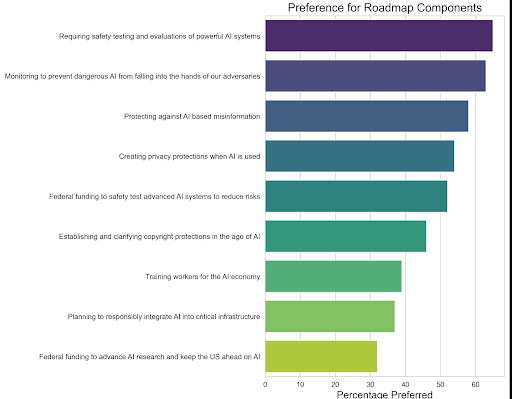New Poll: Voters Prefer AI Regulation that Mandates Safety Measures Over Industry Self-Regulation

An overwhelming majority of American voters prefer regulation that mandates safety testing of frontier AI systems and government oversight to certify new AI models, while 24% prefer a non-restrictive approach.
After being informed of the Senate AI Roadmap priorities and asked to rank their priorities in order, 67% of voters, the highest share, prefer monitoring to prevent AI from falling into the hands of our adversaries.
More than three-fourths of voters support federal regulation of AI that mandates safety measures and government oversight of AI labs instead of allowing AI companies to self-regulate, a new poll by the Artificial Intelligence Policy Institute (AIPI) shows.
When presented with four high level approaches to AI governance, 80% of voters prefer a public policy approach that mandates security standards and safety measures for AI systems’ most advanced models. This approach would allow the release of new AI models only after a government oversight board certifies that companies properly account for extreme risks, including the prevention of using AI to create bioweapons and launch cyber attacks. The question forced voters to choose between varying approaches to AI regulation, from pausing the technology as a whole to letting companies freely develop the technology.

Additionally, the survey reveals that a plurality of voters support policies to prevent AI from falling into the hands of adversaries and support regulatory measures on AI to prevent misinformation and protect the privacy of users.
“AIPI’s latest poll makes it clear that voters support an approach to AI development that ensures the safety of the American public and security of the country—not an industry-led approach,” said Daniel Colson, Executive Director of the Artificial Intelligence Policy Institute. “Americans want transparency between the government and AI companies and support steps to prevent AI from getting out of control, especially preventing its worst possible uses. The bottom line is that voters from across the political spectrum overwhelmingly back an active government approach on AI regulation, one that centers safety and security, not free corporate development.”
Some key numbers from the poll:
- 80% of voters—including 76% of Republicans and 84% of Democrats—prefer a regulatory approach that mandates safety measures of the most advanced AI models and government oversight for the certification and release of new AI models, and only 24% prefer AI companies to self-regulate and be prosecuted if models are used for illegal activity.
- After being informed of the Senate AI Roadmap priorities and asked to rank their priorities in order, 67% of voters prefer monitoring to prevent AI from falling into the hands of our adversaries. 63% of voters—including 69% of Democrats and 63% of Republicans—prefer requiring safety testing and evaluations of powerful AI systems. Meanwhile, just 30% prefer federal funding to advance AI research to keep the US ahead on AI.

- 72% of voters, including 78% of Democrats and 65% of Republicans, support creating privacy protections when AI is used.
- 70% of voters support regulations to prevent AI misinformation–including 80% of Democrats, 59% of Republicans, and 77% of voters 65 years and older. Just 7% of voters are against this.
- 80% of voters—including 84% of Democrats, 84% of Republicans, and 82% of voters 65 years and older—support a law that mandates that all AI labs constructing the most powerful AI models must use state-of-the-art security to prevent the models from being stolen by hostile actors. Just 4% of all voters oppose this policy.
- 69% of voters support regulation that would make it illegal for an AI company to retaliate against an employee if they leak information to the public suggesting that the AI company is compromising safety, including 75% of Democrats and 68% of Republicans.
- Voters want to know when political ads are produced with AI. 64% of voters support the requirement for broadcasters to disclose when a political ad is produced with AI—including 73% of Democrats and 53% of Republicans.
About the Poll
The poll was taken from June 1 to June 5, and contained a survey of 1,481 voters nationally. The survey was conducted in English. Its margin of error is ±5.0 percentage points.
See full toplines and crosstabs here.
About the Artificial Intelligence Policy Institute
The Artificial Intelligence Policy Institute is an AI policy and research think tank founded by Daniel Colson to advocate for ethical oversight of AI for mitigating potential catastrophic risks posed by AI. AIPI’s core mission is to demonstrate that the general public has valid concerns about the future of AI and is looking for regulation and guidance from their elected representatives. If politicians want to represent the American people effectively, they must act aggressively to regulate AI’s next phases of development. AIPI seeks to work with the media and policymakers to inform them of the risks of artificial intelligence and develop policies that mitigate risks from emerging technology while still benefiting from artificial intelligence.
While much of the public discussion has been oriented around AI’s potential to take away jobs, AIPI will be focused on centering the importance of policies designed to prevent catastrophic outcomes and mitigate the risk of extinction. Currently, most of the AI space comprises those with a vested interest in advancing AI or are academics. The AI space lacks an organization to both gauge and shape public opinion on the issues—as well as to recommend legislation on the matter— and AIPI will fill that role.
Ultimately, policymakers are political actors, so the country needs an institution that can speak the language of public opinion sentiment. AIPI’s mission is about being able to channel how Americans feel about artificial intelligence and pressure lawmakers to take action.
AIPI will build relationships with lawmakers by using polling to establish AIPI as a subject matter expert on AI safety and policy issues. Politicians are incentivized to support AI slowdown policies due to the strong majority of voters supporting slowdown and regulation. But AI is currently less salient as a political issue than other topics, as so far, there have only been moderate impacts from emerging AI tech.
AI technological advancement is and will continue to be an evolving situation, and politicians, the media, and everyday Americans need real-time information to make sense of it all. AIPI’s polling will show where people stand on new developments and provide crucial policy recommendations for policymakers.
